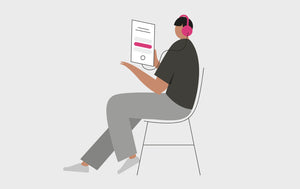Hearing Loss in One Ear
Hearing loss in one ear is a widespread issue and deserves as much attention as other hearing impairments. In this quick read blog post, we discuss:
- What does hearing loss in one ear mean?
- Causes of hearing loss in one ear
- Managing hearing loss in one ear
- How to protect your hearing
What does Hearing Loss in One Ear mean?
Hearing loss in one ear can drastically affect a person's quality of life, communicational and social skills, and the condition is not unique to a specific age group. Also known as Unilateral Hearing Loss, it is a mild to profound hearing loss affecting only one ear.
People suffering from this kind of condition have problems following conversations especially in noisy environments and locating the direction of the sound. It can also be the symptom of some serious medical conditions, so please seek the advice of a medical professional.
Hearing loss can be sensorineural (usually permanent) or conductive, usually treatable and reversible. Conductive hearing loss is commonly occurs in the ear canal or middle ear and some causes include infections, fluid or earwax build-up. Sensorineural hearing loss affects the inner ear or ear nerve. Unfortunately, it is not treatable but a variety of hearing aids exist that can help in managing hearing loss. The reasons behind this type of hearing loss are various, and can be both acquired and hereditary. There are also a number of cases where the cause remains unknown.
Children affected by hearing loss in one ear can have later speech development, shorter attention span and difficulty concentrating. Depending on the particular case, a specialist can recommend different treatments to improve the condition or a suitable type of hearing aid to help in coping with it.
Causes of Hearing Loss in One Ear
The two most important causes are head trauma and sudden sensorineural hearing loss. In both of these cases you should seek immediate medical attention. In some cases if treatment is provided quickly enough some hearing can be restored. The most common reason for hearing loss is advanced age but it can also be a result of various other problems.
Age-related hearing loss is one of the most common global causes of hearing loss in one ear. Hearing loss in one ear can be a genetic condition or acquired during birth. It can also be due to:
- Infections
- Muffled hearing caused by a blockage in the ear
- Various diseases later in life such as meningitis, mumps, measles etc.
- Cerebellopontine angle tumors (usually benign)
- Meniere's disease
- Labyrinthitis
- Meningitis
- Mumps
- Waardenburg syndrome
Many medications have also been proven dangerous for hearing such as some chemotherapy drugs and antibiotics. Apart from all these, however, one of the most widespread enemies of hearing is noise. Continuous exposure to noise could be detrimental to hearing and cause both gradual and sudden hearing loss.
What to do if you're deaf in One Ear
Depending on the cause, different treatments may be recommended to manage hearing loss in one ear. In the case of more severe hearing loss, CROS, bone anchored and bone conduction hearing aids may be better suited to your needs.
Hearing aids are a popular way to manage unilateral hearing loss. Single-sided deafness often requires extra amplification to bring the weaker ear more in-line with your normal ability to hear in your stronger ear. For instance the Signia Silk 1Nx is an almost invisible, mid-range, in-the-ear device.
Online Hearing Test
Check your hearing now with our online hearing test. The test checks each ear when you use headphones and will give clearly separate results for each ear.
It is free, only takes a few minutes, and results will indicate if you should take further action to prevent hearing loss.
About Hearing Direct
We are one of the world's leading hearing aid specialists. HearingDirect offers a wide range of affordable products, and information resources to help improve the quality of life for the hard of hearing. We sell:
- Hearing aids,
- Batteries,
- Accessories such as earplugs,
- and amplified devices such as super loud alarm clocks and amplified phones.
Like and chat to us on our facebook page
Author: Joan McKechnie

After qualifying as a Speech-Language Pathologist and Audiologist Joan has spent most of her 20 year career in hearing-care related roles. She has a wealth of experience within the hearing aid and hearing rehabilitation fields and has worked in manufacturing environments with two hearing aid companies helping to develop products and roll out new technologies. Joan has been involved with Hearing Direct since its launch and enjoys the online retail environment which seeks to provide easier access to hearing products and accessories. She is HCPC registered. Read Joan's full bio here.


